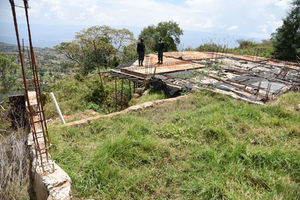
Governor of Nairobi County Johnson Sakaja.
Nairobi was under water this week. Heavy rains on Tuesday night had seen Athi River break its banks and flood premises on Mombasa Road. A mall in that area was inaccessible due to flood waters.
The slums—Mukuru, Mathare, Bosnia—lower-income neighbourhoods such as Ruaraka, Umoja and Githurai, satellite settlements like Ruai, Njiru, Joska and Kahawa West, suburban areas of Limuru, Kenyatta Road, Ruiru and estates such as Garden Estate were severely affected.
Infrastructure was hit, causing inconvenience and traffic chaos: Roads were impassable, bridges and the railway line flooded, causing suspension of service to certain parts of the city.
Our approach to development returned to haunt us. Kenyans pay no regard to wetlands. They merely clear the wet topsoil, poor rocks on top, lots of compacting material and concrete it out, perhaps not knowing that there could be an underground river which will one day break through, especially if the water table rises as a result of lots of rains.
Another tactic is to contain rivers, especially seasonal ones, and build a channel for them. When it rains heavily, these rivers regain full strength and return to their original course, irrespective of what we have built on its way. On Parklands First Avenue, just before Oshwal, there is a case in point.
I found a gate wide open, not for pedestrians or high-end cars but a river that was marching across a community and out of the gate in torrents and rendering the road almost impassable.
The bad news is, this isn’t a one-off. It’s going to get harder to live on this planet. Extreme weather like the bizarre tornados of Dubai and New York and extensive flooding in the desert Middle Eastern countries of UAE, Oman and Saudi Arabia will become more common as we get along.
I am sure you have heard of the newly discovered humongous black hole, more than 30 times the mass of our sun and about 1,900 light-years away from Earth—a stone’s throw in galactic terms.
A rational human being would think it’s one of humanity’s priorities to find ways of getting outta here.
Unfortunately, humanity is an alliance against—not for—life. Nations of the earth, its brightest and most capable people, best and most sophisticated machines, are all directed at finding ever more efficient and more widespread and horrible ways of killing one another and harming life as we know it.
The top 10 defence spenders—USA, China, Russia, India, Saudi Arabia, UK, Germany, Japan, Australia and France, in that order—spend $1.6 trillion on militaries and arms with the US alone accounting for $831 billion of the total.
I’m not into doomsday theorising but I suppose whoever or whatever created us—a superior alien race, our Lord and Saviour or Mr Freak of Nature—can’t be much impressed by our bloodthirsty ways.
Sometimes, when you look at the world, you can’t avoid but get the sense that the system is engineered, by design or otherwise, to create inequality, suffering and enslavement of the majority by small elements of racial elites.
The six wealthiest billionaires are worth $1.073 trillion. I suppose to create such a billionaire, it takes millions of miserable humans to slave away, sometimes for pitiful pay, in the mines of the Congo, in factories and distribution centres all around the world. Human endeavour is driven by accumulation, domination and destruction.
To satisfy this incredible greed and desire to be better and rule over others, man has broken the earth, possibly irreparably, and rather than use the money made from climate harm to repair the damage, some of the billionaires burn their incredible wealth and power to promote climate denialism, cripple climate action and put in power puppets who do their bidding.
The most direct consequence of climate change is changes in rainfall, meaning more intense rain and the flooding and storms it brings, followed by incredibly severe droughts and attendant disasters such as fires and loss of plant cover and species.
Since the glaciers are melting, sea levels rise, which eventually will lead to flooding of coastal and low-lying areas.
The heavy rains did not sneak up on us; they have been in the forecast. There was enough time for the Nairobi City County government to clear drains, deploy equipment and generally have the capital in a state of preparedness.
At the very least, one would have expected the county Dimples to have been out and about letting families know what to expect, what they can do to prepare and what help local government was laying out for them.
I do remember an announcement that the county government was to destroy one of the city’s last green spaces to make way for more concrete, notably a nightclub, supposedly because “sherehe lazima iendelee” (the party must go on).
Nairobi is under water—and in a hole.
- Mr Mathiu, a former Editor-in-Chief of Nation Media Group, is a media consultant at Steward-Africa. [email protected].













